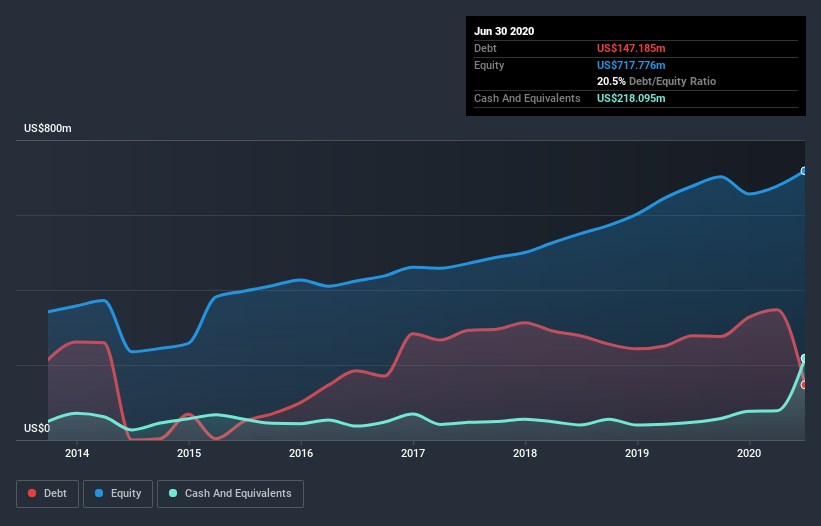These 4 Measures Indicate That Ensign Group (NASDAQ:ENSG) Is Using Debt Reasonably Well

Legendary fund manager Li Lu (who Charlie Munger backed) once said, 'The biggest investment risk is not the volatility of prices, but whether you will suffer a permanent loss of capital.' So it might be obvious that you need to consider debt, when you think about how risky any given stock is, because too much debt can sink a company. We note that The Ensign Group, Inc. (NASDAQ:ENSG) does have debt on its balance sheet. But the real question is whether this debt is making the company risky.
Why Does Debt Bring Risk?
Debt is a tool to help businesses grow, but if a business is incapable of paying off its lenders, then it exists at their mercy. In the worst case scenario, a company can go bankrupt if it cannot pay its creditors. However, a more common (but still painful) scenario is that it has to raise new equity capital at a low price, thus permanently diluting shareholders. Having said that, the most common situation is where a company manages its debt reasonably well - and to its own advantage. When we examine debt levels, we first consider both cash and debt levels, together.
Check out our latest analysis for Ensign Group
What Is Ensign Group's Debt?
You can click the graphic below for the historical numbers, but it shows that Ensign Group had US$147.2m of debt in June 2020, down from US$278.3m, one year before. But it also has US$218.1m in cash to offset that, meaning it has US$70.9m net cash.
How Strong Is Ensign Group's Balance Sheet?
We can see from the most recent balance sheet that Ensign Group had liabilities of US$581.0m falling due within a year, and liabilities of US$1.19b due beyond that. Offsetting this, it had US$218.1m in cash and US$302.1m in receivables that were due within 12 months. So it has liabilities totalling US$1.3b more than its cash and near-term receivables, combined.
This deficit isn't so bad because Ensign Group is worth US$2.99b, and thus could probably raise enough capital to shore up its balance sheet, if the need arose. However, it is still worthwhile taking a close look at its ability to pay off debt. Despite its noteworthy liabilities, Ensign Group boasts net cash, so it's fair to say it does not have a heavy debt load!
Even more impressive was the fact that Ensign Group grew its EBIT by 107% over twelve months. That boost will make it even easier to pay down debt going forward. There's no doubt that we learn most about debt from the balance sheet. But it is future earnings, more than anything, that will determine Ensign Group's ability to maintain a healthy balance sheet going forward. So if you want to see what the professionals think, you might find this free report on analyst profit forecasts to be interesting.
Finally, a business needs free cash flow to pay off debt; accounting profits just don't cut it. Ensign Group may have net cash on the balance sheet, but it is still interesting to look at how well the business converts its earnings before interest and tax (EBIT) to free cash flow, because that will influence both its need for, and its capacity to manage debt. Over the most recent three years, Ensign Group recorded free cash flow worth 52% of its EBIT, which is around normal, given free cash flow excludes interest and tax. This cold hard cash means it can reduce its debt when it wants to.
Summing up
Although Ensign Group's balance sheet isn't particularly strong, due to the total liabilities, it is clearly positive to see that it has net cash of US$70.9m. And we liked the look of last year's 107% year-on-year EBIT growth. So we don't think Ensign Group's use of debt is risky. When analysing debt levels, the balance sheet is the obvious place to start. However, not all investment risk resides within the balance sheet - far from it. Be aware that Ensign Group is showing 1 warning sign in our investment analysis , you should know about...
If, after all that, you're more interested in a fast growing company with a rock-solid balance sheet, then check out our list of net cash growth stocks without delay.
This article by Simply Wall St is general in nature. It does not constitute a recommendation to buy or sell any stock, and does not take account of your objectives, or your financial situation. We aim to bring you long-term focused analysis driven by fundamental data. Note that our analysis may not factor in the latest price-sensitive company announcements or qualitative material. Simply Wall St has no position in any stocks mentioned.
Have feedback on this article? Concerned about the content? Get in touch with us directly. Alternatively, email editorial-team@simplywallst.com.



